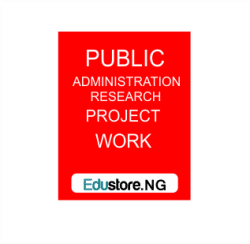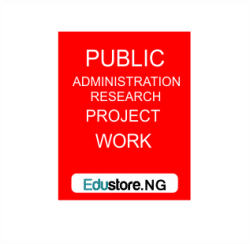A Seminar Paper on the Effect of Team Diversity, Equity and Inclusion on Employee Performance in the Workplace. a Case Study of Airtel Nigeria
Abstract
This study delved into the impact of diversity, equity, and inclusion (DEI) practices on organizational performance within Airtel Nigeria. A quantitative survey research design was adopted to gather insights from employees regarding their perceptions of DEI and its effects on organizational success. A structured questionnaire was developed based on existing literature and theories related to DEI in the workplace. The questionnaire aimed to measure employees’ opinions on various aspects of DEI, including team diversity, equity practices, and the inclusivity of the organizational culture. The study targeted a sample size of 120 respondents, representing a diverse range of roles within Airtel Nigeria. The data collection process involved administering the questionnaire to the selected participants, ensuring anonymity and confidentiality to encourage honest responses. The Statistical Package for the Social Sciences (SPSS) version 27 was utilized for data entry, analysis, and presentation. The hypotheses formulated were tested using appropriate statistical techniques, including the t-test. The t-test was particularly employed to assess the relationships between variables such as team diversity and employee performance, equitable treatment and job satisfaction, and the correlation between inclusive environments and productivity levels. The findings of the study revealed significant insights into the relationship between DEI practices and organizational outcomes within Airtel Nigeria. For instance, the t-test results indicated a strong positive correlation between team diversity and improved employee performance. Similarly, equitable treatment and opportunities within teams were found to have a positive impact on employee satisfaction and engagement levels. Furthermore, inclusive organizational cultures were associated with higher productivity outcomes among employees. Based on these findings, the study concluded that fostering diversity, equity, and inclusion initiatives within organizations like Airtel Nigeria can lead to enhanced organizational performance and employee well-being. The recommendations derived from the study include implementing targeted DEI policies, conducting regular training on bias awareness, and promoting inclusive leadership practices throughout the organization. In conclusion, this research contributes valuable insights into the practical implications of DEI strategies in enhancing organizational success. By adopting a quantitative survey approach and utilizing statistical analysis techniques, the study provides empirical evidence supporting the importance of DEI initiatives in driving positive organizational outcomes. These findings offer actionable recommendations for organizations seeking to leverage DEI as a strategic asset for sustainable growth and success.
Background to the Study
In today’s globalized and competitive business environment, organizations are increasingly recognizing the importance of diversity, equity, and inclusion (DEI) within their workforce. Diversity encompasses differences in race, ethnicity, gender, age, sexual orientation, religion, and more (Pillay & Singh, 2018). Equity refers to fairness in opportunities and treatment, ensuring that everyone has access to the same resources and chances for advancement (Rehman, Mohamed, & Ayoup, 2019). Inclusion involves creating a welcoming environment where all employees feel valued, respected, and empowered to contribute their unique perspectives (Ogunsanwo, Adelugba, & Obarfo, 2021).
Airtel Nigeria, a leading telecommunications company, operates in a dynamic and diverse market. The company’s success depends not only on technological advancements but also on its ability to harness the strengths of a diverse workforce while ensuring equity and fostering inclusion (Obamiro, Kumolu-Johnson, & Ngwamaj, 2019). Understanding how team diversity, equity, and inclusion impact employee performance is crucial for Airtel Nigeria and similar organizations striving for excellence in a competitive industry (MUTHONI, 2017).
Diversity within the workforce brings a range of perspectives and experiences, which can lead to increased creativity and innovation (Al-Habib, 2020). When employees from different backgrounds collaborate effectively, they can generate unique solutions to complex problems, giving the company a competitive edge (Barney, 2021). Moreover, equitable treatment ensures that individuals are judged based on their skills and contributions rather than external factors like race or gender, fostering a merit-based culture (Shrestha & Parajuli, 2021). Inclusive environments further enhance these benefits by creating a sense of belonging and encouraging active participation from all team members (Mwatumwa, 2020).
Airtel Nigeria’s commitment to diversity, equity, and inclusion can lead to several tangible benefits. For example, diverse teams are more likely to understand and cater to the needs of a diverse customer base, improving customer satisfaction and loyalty (Zamani, 2022). Equity in opportunities and advancement reduces turnover rates and increases employee retention, saving the company recruitment and training costs (Nnadi & Chinedu, 2019). Inclusive workplaces also experience higher levels of employee engagement and productivity, contributing to overall organizational success (Lim, 2020).
However, implementing and maintaining effective DEI practices requires ongoing efforts and strategic initiatives. Leaders and managers play a crucial role in promoting diversity and inclusion, setting the tone for the organizational culture (Gupta, Bhatta, & Bhatt, n.d.). Training programs and policies that promote fairness and inclusivity are essential components of a successful DEI strategy (Tasheva & Hillman, 2019). Continuous evaluation and feedback mechanisms help identify areas for improvement and ensure that DEI efforts align with the company’s goals and values (Makhdoomi, G. B. Review, & undefined, 2017).
Statement of Problem
The importance of diversity, equity, and inclusion (DEI) in the modern workplace is widely acknowledged, with research highlighting their positive impacts on organizational performance (Pillay & Singh, 2018). However, despite increased awareness and efforts to promote DEI, many organizations, including Airtel Nigeria, still face significant challenges and gaps in fully leveraging these principles for optimal outcomes.
One key gap is the need for a deeper understanding of how specific aspects of diversity, such as age, gender, and cultural backgrounds, impact team dynamics and performance within the telecommunications industry (Obamiro, Kumolu-Johnson, & Ngwamaj, 2019). While studies have shown the potential benefits of diverse teams, there remains a lack of comprehensive research into the nuanced effects of different diversity dimensions on employee collaboration, innovation, and productivity (MUTHONI, 2017).
Another gap lies in the area of equity and fairness in opportunities and treatment within organizations (Shrestha & Parajuli, 2021). Despite efforts to promote equality, disparities may still exist in terms of access to career advancement, training opportunities, and decision-making processes (Nnadi & Chinedu, 2019). Understanding the root causes of these disparities and their impact on employee morale, engagement, and retention is essential for creating a more inclusive and equitable work environment (Lim, 2020).
Furthermore, while the benefits of inclusion are well-documented, there is a need for research that delves into the specific strategies and practices that foster a culture of inclusion within diverse teams (Mwatumwa, 2020). This includes examining the role of leadership, organizational policies, and training programs in promoting inclusivity and mitigating biases and barriers to participation (Tasheva & Hillman, 2019).
Addressing these gaps requires interdisciplinary research that combines insights from organizational behavior, human resource management, and diversity studies (Makhdoomi, G. B. Review, & undefined, 2017). By identifying and filling these gaps in knowledge, organizations like Airtel Nigeria can develop targeted strategies and interventions to enhance DEI practices, improve employee satisfaction and performance, and ultimately achieve sustainable competitive advantage in the telecommunications industry (Pillay & Singh, 2018).
Objectives of the Study
The following specific objectives were examined:
- To assess the impact of team diversity on employee performance in Airtel Nigeria.
- To evaluate the role of equity in promoting fair treatment and opportunities for employees within teams at Airtel Nigeria.
- To examine the relationship between inclusion and employee satisfaction, engagement, and productivity within Airtel Nigeria teams.
Research Questions
The following research questions were examined:
- How does team diversity influence employee performance in Airtel Nigeria
- What practices or policies contribute to equity and fairness within teams at Airtel Nigeria?
- How does a culture of inclusion affect employee satisfaction, engagement, and productivity in Airtel Nigeria teams?
Research Hypotheses
The following hypotheses were tested:
- Greater diversity within teams at Airtel Nigeria does not leads to improved employee performance.
- Equitable treatment and opportunities within teams positively impact employee satisfaction and engagement at Airtel Nigeria.
- Inclusive environments in Airtel Nigeria teams do not correlate with higher levels of employee productivity.
Significance of the Study
The significance of studying the impact of diversity, equity, and inclusion (DEI) on employee performance in the workplace, particularly within the context of companies like Airtel Nigeria, cannot be overstated. This research holds profound implications for organizations, employees, academia, and society at large.
Firstly, understanding the relationship between DEI and employee performance is crucial for organizational success. Airtel Nigeria operates in a highly competitive industry where innovation, efficiency, and customer satisfaction are paramount. Researching how team diversity, equitable practices, and inclusive environments influence employee engagement, productivity, and retention can provide valuable insights. These insights can inform strategic decision-making, policies, and practices within the company to create a more conducive and rewarding work environment.
Moreover, this study can contribute significantly to academic knowledge and research in the fields of organizational behavior, human resource management, and diversity studies. By examining real-world cases such as Airtel Nigeria, researchers can develop and test theoretical frameworks, models, and hypotheses related to DEI’s impact on employee outcomes. This academic contribution can lead to a deeper understanding of the mechanisms through which diversity, equity, and inclusion influence organizational effectiveness and competitive advantage.
From an employee perspective, the study’s findings can have direct implications for job satisfaction, career development, and well-being. Employees who feel valued, respected, and included in their workplace are likely to be more motivated, engaged, and committed to their roles. By identifying best practices and areas for improvement in DEI initiatives, organizations like Airtel Nigeria can enhance employee experiences, leading to higher levels of job satisfaction, lower turnover rates, and increased loyalty.
Additionally, studying DEI’s impact goes beyond individual organizations; it has broader societal implications. Inclusive workplaces that embrace diversity and promote equity not only benefit employees and organizations but also contribute to social cohesion, equality, and diversity acceptance in society. Research in this area can shed light on effective strategies for building inclusive cultures, reducing biases and discrimination, and fostering a more equitable society overall.
Furthermore, the findings of this study can serve as a benchmark and guide for other organizations operating in similar industries or facing similar challenges. Lessons learned from Airtel Nigeria’s experiences in managing diversity, equity, and inclusion can be translated into actionable recommendations and best practices for improving DEI initiatives across various sectors and regions.
Scope of the Study
This study focuses on employees within teams at Airtel Nigeria and their experiences related to diversity, equity, and inclusion. The scope encompasses factors such as demographic diversity, fairness in policies and practices, inclusivity in team dynamics, and their collective impact on employee performance. The study will draw insights from qualitative and quantitative data gathered from employees and managers within Airtel Nigeria, providing a comprehensive analysis of DEI’s effects on workplace outcomes.
References
Charmaz, K. (2016). Constructing grounded theory: A practical guide through qualitative analysis. Sage Publications.
Eisenhardt, K. M. (2015). Building theories from case study research. Academy of Management Review, 14(4), 532–550.
Goddard, W., & Melville, S. (2020). Research methodology: An introduction (2nd ed.). Blackwell Publishing.
Robson, C. (2020). Real-world research (2nd ed.). Blackwell.
Yin, R. K. (2018). Case study research and applications: Designs and methods (6th ed.). Sage Publications.
DOWNLOAD COMPLETE WORK- For Reference Only: Materials are for research, citation, and idea generation purposes and not for submission as your original final year project work.
- Avoid Plagiarism: Do not copy or submit this content as your own project. Doing so may result in academic consequences.
- Use as a Framework: This complete project research material should guide the development of your own final year project work.
- Academic Access: This platform is designed to reduce the stress of visiting school libraries by providing easy access to research materials.
- Institutional Support: Tertiary institutions encourage the review of previous academic works such as journals and theses.
- Open Education: The site is maintained through paid subscriptions to continue offering open access educational resources.






